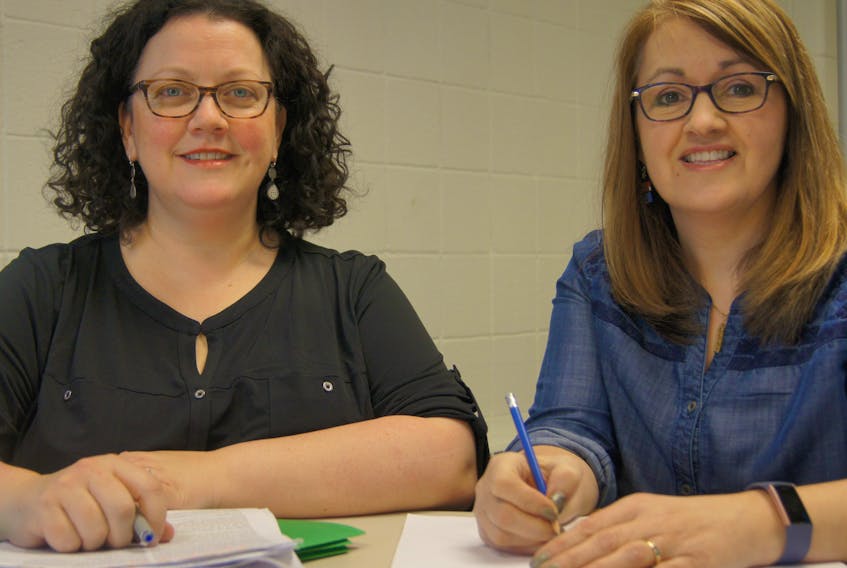CORNER BROOK — The Newfoundland and Labrador Laubach Literacy Council (NLLLC) has been struggling for some time to reach the people who need its services.
“There’s people out in communities that do not have any type of literacy services,” said Margie Lewis, executive director of the council, which is based in Corner Brook.
The council, which offers a one-to-one tutoring service, has been grappling with the question of how to reach those people and get into those communities where it doesn’t have tutors, or where those who were tutoring have moved away.
What started as a conversation in 2018 is getting closer to becoming the solution the council has been looking for.
Lewis and Kelly Taylor-Hulan had been talking about the barriers people face in online learning.
Taylor-Hulan has been teaching online for 15 years and that was the focus of work she was doing for her master’s degree in communications and technology through the University of Alberta. She was getting ready to start her capstone project, wanted to do something that would count and suggested they could help each other.
The result is Going the Distance, a project launched by the NLLLC in April 2019 to bring its one-to-one tutoring program online. Taylor-Hulan is the lead researcher on the $281,000-project, which is funded by the NL Workforce Innovation Centre.
“The ultimate goal is to create an online platform so that Laubach Literacy can reach more people in an online environment while still keeping their one-to-one tutoring model,” said Taylor-Hulan.
When looking at how people learn and are educated, there is a big emphasis on the written word, she said.
In polling some instructors in the public college system, she found 100 per cent rely heavily on email, 78 per cent rely heavily on discussion postings and over 50 per cent graded those discussion postings.
If that’s in a communications or English class, it is OK, but for a class about customer service, that's not necessarily so, Taylor-Hulan said.
“(Online) courses need to be designed differently,” she said. "They need to have more click and drag options, more audio, more visual and be less text-based.”
Through the research project, Taylor-Hulan and research assistant Todie Winter have been interviewing people without high school diplomas on how they use technology. They had a goal of reaching 50 people, but surpassed that, with 57.
Some say they don’t know anything about computers, yet they use smartphones all the time. And when asked if they did any web conferencing the answer was no, yet they knew about using Facebook and Google Hangouts.
They’ve also been auditing online courses for people with low literacy offered by the Sioux-Hudson Literacy Council in Ontario. That has included course in resumes, mental health, accounting and writing. Taylor-Hulan said seeing the tools they use, and material covered has been beneficial to them.
They found that having material available for people to work on, on their own was good.
“But they really, really need contact with their teacher or instructor.”
It helps to give them accountability and encouragement, said Taylor-Hulan.
The next step for the project is to create an online learning platform taking the NLLLC’s paper material and translating it to an online format. That will likely focus on Level 2 of the NLLLC program. Participants at that level have some reading skill, which is needed for online learning.
They expect to have a test version of the program ready within the next six months that will likely be delivered through Google Classroom, something the K-12 school system has been using more during the COVID-19 pandemic.
“Parents are seeing Google Classroom being used by their children. So, Google Classroom is not as foreign to people now as it was before the pandemic,” said Taylor-Hulan.
The project will end in March 2022 and by then they’ll know what works and what doesn’t, and it will be easily built upon, Taylor-Hulan said.
“Once we build the units that we need you can put anything in there, just follow the same template,” she said.
Lewis is hopeful the project will help the council reach the people they need to.
People may not be online doing education courses, but they are online doing other things and may not be contacting the council.
“So, maybe this might be just one other way that we at least give them a choice,” she said.
“For us it’s about being able to provide that one-to-one service online and then hopefully be able to reach people that can’t be reached right now.”
She says online learning can be expanded to tutor training and other programs offered by the council, such as Summer Reading for Fun.
Twitter: WS_DianeCrocker









